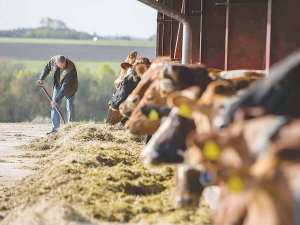Dry conditions highlight importance of Body Condition Scoring ewes at weaning
The dry conditions being experienced along much of the east coast of both Islands build a strong case for body condition scoring ewes at this season’s weaning.
 Feeding quality pasture and supplements will be crucial for getting cows in calf and putting milk in the vat
Feeding quality pasture and supplements will be crucial for getting cows in calf and putting milk in the vat
As dairy farmers head into mating with lower cow body condition scores than last season, feeding quality pasture and supplements will be crucial for getting cows in calf and putting milk in the vat.
A ruminant nutritionist for Grain- Corp, Christian Muller, says as cows start mating, the risks and rewards of feeding rise sharply, so it’s time for dairy farmers to be wary.
“Getting cows’ nutrition balance right will enable dairy farmers to hit high production numbers and have good cow responses to mating. Get it wrong and the problems will mount.
“Cows are experiencing big energy shifts right now. This season has put a lot of stress on animals and we’re seeing cows approach mating with lower body condition than last year.
“Good quality pasture and supplementary feed are going to be important to help cows get into calf and put milk in the vat.”
Muller says choosing the right feed is more than just filling a cow’s stomach.
“Most farmers know how the rumen of their cows functions, but what they’re less aware of is that they are not only feeding the cow but also billions of bacteria living inside the rumen,” says Muller.
“I’ve had the privilege of studying the science of how the rumen functions for most of my working life, first in South Africa, then at Kansas State University for my Masters. The rumen is a fascinating nutrient factory.
“Inside the rumen there is a mutually beneficial relationship between bacteria and the cow, which means both organisms help each other. Bacteria break down feed consumed by the cow (pasture and other feed ingredients) and provide nutrients to the cow (such as protein, energy, minerals, & vitamins). The cow gives bacteria a healthy environment to live and grow in. One species can’t survive without the other.
“Cows need energy and protein in the right balance, not only to produce milk but also to allow the cow to become pregnant in a timely manner. For cows to get these elements from the grass, they need bacteria to break the feed down into nutrient forms the animals can use.”
To explain why rumen bacteria are important, Muller likens the activity of bacteria to kids playing with Lego.
“Healthy microbes are a source of energy and protein to the cow. Crude protein in feed is the building blocks for the bacteria to produce more bacteria, which means more protein and energy is available to the cow.
“To put these building blocks together, bacteria need fermentable energy. If there are lots of building blocks but the bacteria kids are too tired to put them together, they can’t build as many new structures. Or, if the kids are active but there aren’t enough building blocks, the number of newly built structures will also be limited.”
The key to optimum cow productivity is getting the energy-protein balance right, he adds.
Global trade has been thrown into another bout of uncertainty following the overnight ruling by US Supreme Court, striking down President Donald Trump's decision to impose additional tariffs on trading partners.
Controls on the movement of fruit and vegetables in the Auckland suburb of Mt Roskill have been lifted.
Fonterra farmer shareholders and unit holders are in line for another payment in April.
Farmers are being encouraged to take a closer look at the refrigerants running inside their on-farm systems, as international and domestic pressure continues to build on high global warming potential (GWP) 400-series refrigerants.
As expected, Fonterra has lifted its 2025-26 forecast farmgate milk price mid-point to $9.50/kgMS.
Bovonic says a return on investment study has found its automated mastitis detection technology, QuadSense, is delivering financial, labour, and animal-health benefits on New Zealand dairy farms worth an estimated $29,547 per season.

OPINION: Here w go: the election date is set for November 7 and the politicians are out of the gate…
OPINION: ECan data was released a few days ago showing Canterbury farmers have made “giant strides on environmental performance”.